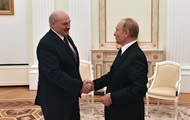Lukashenka expects 28 “union programs” to be adopted with Russia in October and called it a breakthrough.
Vladimir Putin rested with Sergei Shoigu in the taiga and received his permanent guest, Alexander Lukashenko, in the Kremlin.
Belarusian Ambassador to Moscow Vladimir Semashko said that the parties are going to sign a package of roadmaps for the integration of Russia and Belarus.
But instead of signing, another announcement took place.
Correspondent.net follows the allied saga of Moscow and Minsk.
New transfer
“We are ready to discuss 28 programs at the last stage in order to enable the governments to consider them once again at the expert and governmental level tomorrow. programs. This will be a breakthrough. A breakthrough in many areas. This is not a secret. We will publish these programs, show in which areas we have worked, “Lukashenko said at a meeting with Putin.
At the same time, Lukashenka, as usual, called the Russians and Belarusians “practically one people, descended from the same root.”
Long history
The authorities of Russia and Belarus have been discussing the political integration of the two countries since 1999. In 2019-2020, negotiations were built around 31 roadmaps, including integration in various spheres of economy and management. At the same time, draft roadmaps have never been published.
What the roadmaps contain has been and remains a mystery. The authorities of the two countries have not yet talked about any specifics on economic integration.
These cards were the result of negotiations of a working group created in 2018, led by the then Minister of Economic Development of Russia Maxim Oreshkin and Dmitry Krutoy, who served as Minister of Economy of Belarus. As a result of these negotiations, “progress was made” on issues of integration in agriculture, communications, customs and the oil market, Oreshkin said.
“We have the principle that we are guided by – these are two sovereign countries and one economy,” the Russian minister said.
The same general wording was in the 1999 treaty, from which the Union State began. In that document, economic integration was interpreted as the creation of a single economic space, in which general legislation governing economic activity, including civil and tax legislation, is in effect.
EPA
–
Problems of Belarus
Frequent meetings with Putin on Russian territory are a consequence of Lukashenka’s international isolation.
In 2018, Russia began to change the system of taxation of the oil sector – this reform is called a tax maneuver. Since 2019, export duties on oil have been gradually decreasing in Russia, and by 2024 they should reach zero. At the same time, the tax on the extraction of minerals is being increased.
Belarus received Russian oil without export duties. As taxes are zeroed, the country is actually deprived of discounts on Russian oil, and in 2024 it will receive it at world prices. The Belarusian Ministry of Finance estimated losses from the tax maneuver in 2019-2020 at $ 800 million.
Luke’s game
Lukashenka expects financial and political support from Putin, but is trying to avoid the integration of the two countries at the state and military level, believes the Belarusian political scientist Ryhor Astapenya.
“Lukashenka will try to sell the sovereignty of Belarus in parts, at a high price, but by and large he has no choice left to sell or not to sell. Because he ruined relations with the West very much, ”Astapenya says in an interview with the BBC.
The two presidents often meet, because there is a bargaining: on what conditions should and will Russian support be provided, another Belarusian political scientist Artem Shraibman is sure: “This is always bargaining, and intensive bargaining.”
The expert pointed out that despite the tough international isolation of Belarus, over the past year there have been no serious progress in the field of integration, as well as serious economic compromises.
Even if Minsk approves new union programs, it will not necessarily fulfill them, says Shraibman: “Lukashenka can talk about such things for years.”
In his opinion, these programs are not very interesting for Russia either, which is seeking more concrete and tangible ways to leave Belarus in its sphere of influence under any future government. For example, the deployment of Russian military infrastructure or the reorientation of Belarusian foreign trade towards Russia.
In March, it was agreed to create a joint combat training center for the Air Force and Air Defense near Grodno, which, among other things, will house Russian Su-30 aircraft. In August, the first Russian military arrived at the site of the future center.
– .


